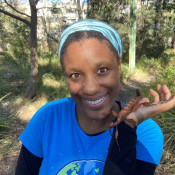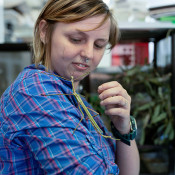<< See all events
Bees and Blobs: exploring the decoy effect in bee colonies and giant amoebas
Most organisms are at some point faced with decisions such as who to mate with, where to live or what to eat. Most models of decision-making assume that the presence of ‘irrelevant’ items such as inferior or unavailable items will not affect an individual’s preference for other items in the choice set. However, an increasing body of literature suggests that humans and other organisms are susceptible to ‘decoy effects’ where the presence of low value items drastically changes or even reverses preferences for other items in the choice set.
In this talk we will discuss evidence for the decoy effect in a range of very different organisms: from unicellular slime mould amoebas to foraging possums to colonies of honeybees, stingless bees, and bumblebees. We show that decoy effects are taxonomically widespread, however, the conditions under which they occur remain unclear. We'll delve into the question of whether decoy effects are merely artifacts of contrived experimental setups or if they can genuinely occur in natural settings. Last, we will discuss the potential implications of decoy effects on the design and interpretation of experiments.

